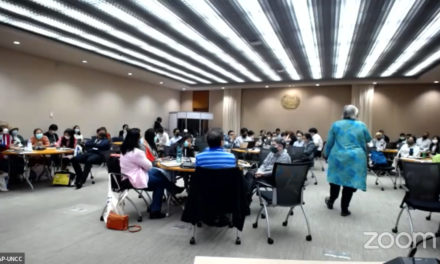“If the draft text is endorsed as is, services liberalization will be the trophy the developed countries will bring home from Hong Kong. Developing countries will all be forced to be open services in all sorts of areas – including water, education and health care,” said Aileen Kwa of Focus on the Global South.
“It is alarming that Lamy and Mexican Ambassador Fernando de Mateo, the chair of the Council for Trade in Services (CTS) seem resolute to force this non-consensual text down the throats of delegations,” added Kwa.
Kwa further noted that “Annex C of the draft ministerial text on services, which is likely to be included in the Hong Kong text, reads like an agreed-upon negotiating text already, and a mandate to intensify the negotiations in ways which are completely at odds with the GATS flexibilities. Wording included in the main body of the text to clarify that Appendix C does not represent the views of all members masks the pressure that is on developing countries to accept its terms.”
Another alarming development in the services text is the push for greater emphasis on proposals for possible framework for government procurement. This a sneaky manoeuver to add government procurement ( the purchasing of goods and services by government) – a new issue that was rejected in Cancun – on the agenda.
The draft ministerial text also attempts to play the ‘development’ card in Hong Kong, reiterating the promise of Doha by incorporating a development package that includes Special and Differential Treatment, aid for trade, and TRIPS and Health. The emphasis on this paltry development package is an attempt to draw in the support of mainly the least developed countries.
As Aileen Kwa noted “ the main thrust of the text is to distract the African and LDCs with a so-called ‘development package’ on the one hand, while extracting onerous commitments through the main issues under negotiations-services, agriculture and industrial tariffs.”
Because of wide disagreements among Members and the media attention that the agriculture and NAMA negotiations have generated, proponents of the new deal are scaling down expectations in these two crucial areas in order to buy time. What they expect to come out of the ministerial conference in Hong Kong are clear parameters that would allow the negotiations on the contentious issues over formulas and bindings to continue and effectively be concluded by 2006.
What might come out of Hong Kong is a second version of the July Framework – a document that locks–in areas of convergence largely over principles but this time narrowed down even further to include consensus on such matters as the type of formula for tariff reduction and approaches to new tariff bindings.
For further information or to arrange an interview please contact Brett Solomon + 852 64972675 (Hong Kong) or Aileen Kwa +41 (0) 79 625 8536 (Geneva). www.focusweb.org







